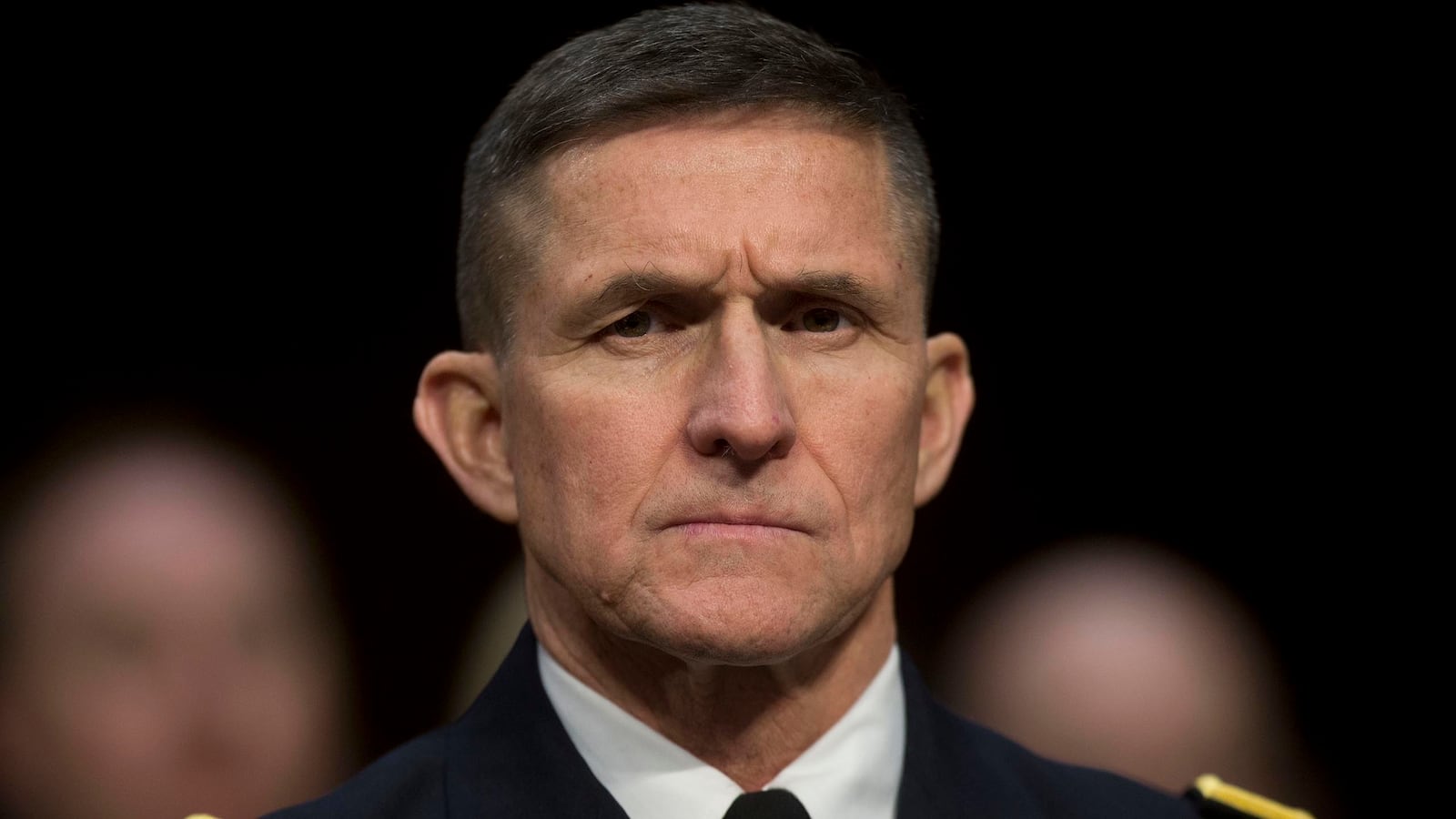The Obama administration’s former military intelligence chief is warning Congress that Islamic extremism has expanded in every way imaginable over the past year—and the administration he was once part of is not doing enough to stop it.
“According to every metric of significance, Islamic extremism has grown over the last year,” said retired Lt. Gen. Michael Flynn Friday, in remarks submitted to the House Armed Services Committee which were obtained by The Daily Beast. “We are at war with violent and extreme Islamists (both Sunni and Shia) and we must accept and face this reality.”
His remarks are a pointed attack on the Obama administration’s handling of the Islamic State group in Iraq and Syria, and a public airing of some of the frustrations that led Flynn to leave his post as head of the Defense Intelligence Agency last summer—a year early.
“There are some who counsel patience, arguing violent Islamists are not an existential threat and therefore can simply be managed as criminals,” he said. “I respectfully and strongly disagree.”
His comments also reflect frustration with the White House’s refusal to use the term “Islamic militant”—linking the religion with acts of violence. Flynn stated in earlier remarks to a group of retired special operators in January that only by calling the movement by its name can one martial the right kind of tools to fight it.
“You cannot defeat an enemy you do not admit exists,” Flynn told the National Defense Industry Association in Washington last month.
Administration officials have said they reject using such a term at the request of Arab and Muslim allies who do not want to play into the Islamic State group’s aspirations of building a caliphate.
Flynn also took issue with that, railing against U.S. cooperation with Arab nations he says support militancy by supporting extreme versions of Islam—a dimly veiled reference to Saudi Arabia and Qatar who support Islamic schools and charities beyond their borders that practice a strict version of Islam.
“If our so-called partners do not act in accordance with internationally accepted norms and behaviors or international law, the United States must be prepared to cut off or severely curtail economic, military and diplomatic ties,” he said.
The White House rejected Flynn’s comments.
“There is no question that we are at war those who carry out acts of terrorism in service to a corrupted version of the Muslim faith,” including al-Qaeda, ISIS and others said Ned Price, the National Security Council’s assistant press secretary. “The President has not shied away from this confrontation with those who would do us harm, and anyone who may be inspired by their hate-filled rhetoric, and we will continue to be aggressive in confronting them,” he wrote by email Friday, in response to an emailed copy of Flynn’s prepared remarks.
“Regardless of what you call them, at their core, these individuals are terrorists,” Price wrote, adding that after six years in office, “no one can doubt the President’s resolve to confront this threat. He’s made it clear that we are at war with terrorist groups—AQ and ISIL. He’s taken scores of high level terrorists off the battlefield—from Osama Bin Laden to Anwar al-Aulaqi and Abu Khattalah, the Benghazi plotter. Whatever others call these individuals, we call them our enemies, and we will continue to treat them as such.”
Flynn, however, is calling for a wider, worldwide campaign against militancy.
“We have to energize every element of National Power—similar to the effort during WWII or during the Cold War—to effectively resource what will likely be a multi-generational struggle,” he said. “There is no cheap way to win this fight.”
The Iraq and Afghan war veteran, who once served as intelligence chief for the elite counterterrorist force, the Joint Special Operations Command, urged going on the attack, rather than waiting for the enemy to launch new violence inside the U.S.
“We must engage the violent Islamists wherever they are, drive them from their safe havens and kill them,” he said. “There can be no quarter and no accommodation.”
Flynn said he supported Congress issuing a new Authorization for the Use of Military Force to fight the new threat, but said the legislation should be free from time limits and other restrictions to allow the military to fight the enemy as long as it exists.
Flynn’s sentiment was reflected by many on the committee including ranking member, Washington state Democrat Adam Smith, who sees the fight against the militants as a “long-term ideological struggle,” much like the 75-year campaign against communism.
But Smith caveated that, saying the fight-back had to include moderate Muslim voices.
“The Muslim world does not want the United States to show up and tell it what it ought to do,” he said. “We have to figure out how we can be helpful to support those moderate voices so that they can triumph, so that they can defeat these extremist ideologies.”
Flynn’s testimony was countered by one of his fellow panelists, Dr. Marc Lynch, a Mideast specialist from George Washington University, who said the administration’s campaign against the Islamic State Group is working.
“The momentum of ISIL (ISIS)...has been halted,” he said. “They’re no longer able to advance, they suffered a serious defeat in—in Kobani thanks to coalition air power.”
Committee chairman Mac Thornberry, R-Texas, said he hoped Lynch was right, but his tone seemed to indicate doubt, throughout a hearing which seemed mostly designed as a vehicle to hear Flynn warn against a sweeping battle with militants to come.





